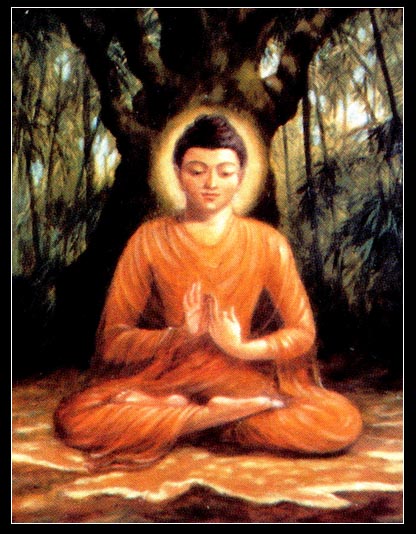
It is well known that the Buddha is one of the avatars of Vishnu. What is not so well known is that this avatar is not about the historical personage known to the Buddhist faith. This is something else altogether, a peculiar attempt at cooption which took the form of a badly designed myth. Buddhism was driven out of the land of its birth and rendered almost extinct there too, but the sheer greatness of the Buddha required a cultural adjustment, if not downright assimilation. It was an intolerable humiliation if such greatness was not somehow part of the Great Tradition and remained forever as a powerful heresy that actually reduced the mother faith to a minority status for a while. The inclusion of the Buddha in the avatar cycle was a somewhat confused attempt to include aspects of spirituality that had seemed to have had bypassed the Hindu Weltanschauung.
The avatar story as it exists in the texts is unique in that it is not a grand narrative as are the other avatar stories. There is more than a modicum of sheer embarrassment at the nature of this engulfing invented narrative. The Bhagvata Purana, for instance, has only four paragraphs devoted to the most important avatar ever known to India after Krishna. It is not even a myth, for the nature of a myth is that it is rarely real but always true. This is an afterthought, an alternative explanation for a faith that swept the land and was reabsorbed only by integrating all its features to the extent that the man who contributed the most to the process of re-establishing the intellectual dominance and popularity of Hinduism, Adi Shankara, was called a hidden Budhhist. The Buddha was too important, too influential and too obviously a genuine spiritual giant to be disregarded - once the faith itself was rendered sterile. Only by making Buddha an avatar of Vishnu could any backsliding be prevented.

The avatar story as it exists in the texts is unique in that it is not a grand narrative as are the other avatar stories. There is more than a modicum of sheer embarrassment at the nature of this engulfing invented narrative. The Bhagvata Purana, for instance, has only four paragraphs devoted to the most important avatar ever known to India after Krishna. It is not even a myth, for the nature of a myth is that it is rarely real but always true. This is an afterthought, an alternative explanation for a faith that swept the land and was reabsorbed only by integrating all its features to the extent that the man who contributed the most to the process of re-establishing the intellectual dominance and popularity of Hinduism, Adi Shankara, was called a hidden Budhhist. The Buddha was too important, too influential and too obviously a genuine spiritual giant to be disregarded - once the faith itself was rendered sterile. Only by making Buddha an avatar of Vishnu could any backsliding be prevented.

The stories about Buddha are simple and also, alas, somewhat insulting, reflecting as they do the medieval degeneracy of intellect in India that could not rise above such productions. The core narrative usually goes something like this. Danavas and daityas, demon enemies of the gods, had gained supremacy over the sacred cities of the earth through their exemplary moral conduct and control of the fire sacrifices. (Moral conduct is following the rules of theology, not genuine goodness, which explains why the demons often had an advantage.) To win back the supremacy of the gods, Vishnu incarnates on earth as the Buddha and preaches a doctrine that there is no soul, fire sacrifices and other sacred rituals are useless, the Vedas just priestly scribbling, the caste system a useless contrivance, while the body is supreme and should be indulged as there is no life after death. Convinced by these pleasurable doctrines, the demons sin often and mightily, fall from grace, and the old religion was reinstated with relief by a people who were ostensibly yearning for it all the while. In some other versions, notably the Skanda Purana, Vishnu resorts to this trickery to get back the sacred city of Kashi for Shiva, who had been driven from it by the unbearable power of austerities practiced by the King Divodasa.


In yet another version in the Shiva Purana, the Buddha is an incarnation of the sage Gautama. This worthy was too saintly and great for his jealous Brahmin neighbors to bear with equanimity and they conspired to drive him away on a false charge of cow slaughter. The angry Gautama retaliated by propagating a faith that smashed Brahmanical privileges and reduced their social influence drastically. This is an attempt to explain away the phenomenon that was the Buddha, by playing with the similarity in names, for the Buddha's original name was Siddhartha Gautama. It also grimly concedes a ressal fallout of the Buddhist faith, the Brahmins came very close indeed to being marginalized forever.


It is worth recording here that the Swami Vivekananda, who was indulgently tickled by all alternative versions of sacred stories in India, used to lose his temper when ever he considered what had been done to the Buddha's life -going so far as to say that the Hindus were the real demons for making up such scandalous tales about the greatest religious figure India had for many thousands of years. Such tales were Hinduism's backhanded compliment to the greatest man to ever arise from within its body and offer a credible challenge with an alternative viewpoint of spirituality. The Buddha remained an inexplicable, perpetually threatening counterpoint to the Great Tradition until he was covered over by the obscuring mass of the mythology of Vishnu. Most Hindus today are innocently unaware of these developments and really believe, in total sincerity, that the Tathagatha of the Sangha is identical to the avatar of Vishnu.
No comments:
Post a Comment